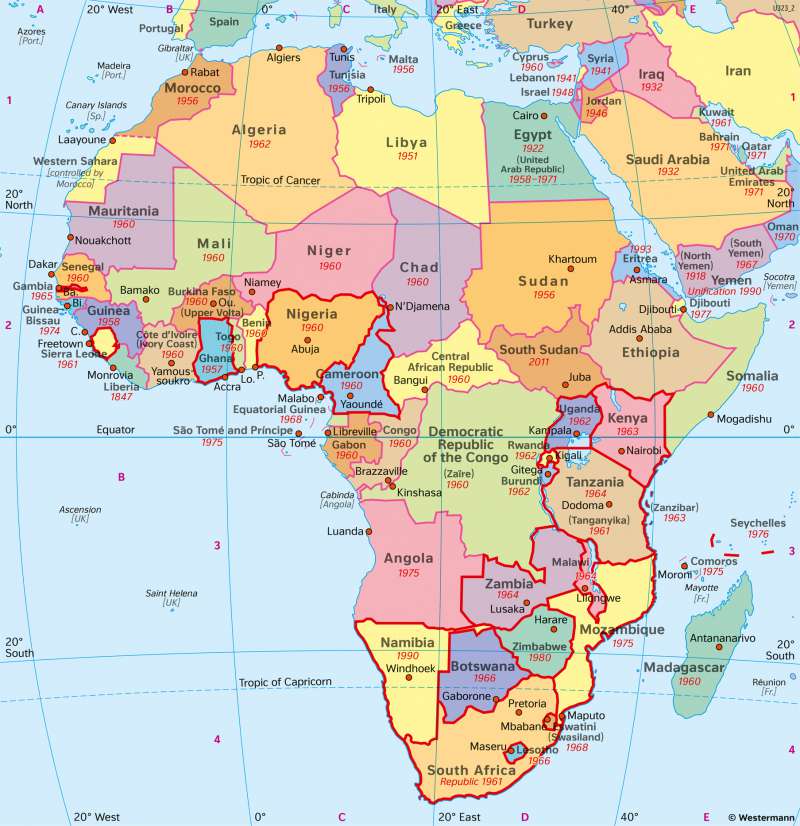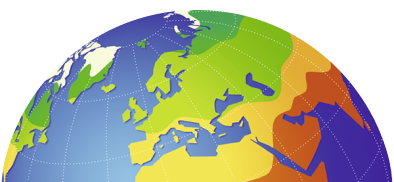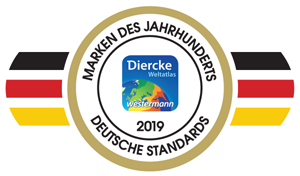Africa - Political map
History and countries
978-3-14-100890-6 | Page 145 | Ill. 3

Overview
The political map of Africa shows the independent state entities of the post-colonial era. The first changes came with the end of the First World War. The defeated German Empire had to relinquish its colonial possessions, which fell to the victorious powers as mandated territories. In 1922, Great Britain declared Egypt an independent kingdom, but maintained a number of privileges in foreign policy and with regard to the Suez Canal. Ethiopia, which had been independent for a long time, was conquered by fascist Italy in 1935/36, but was granted independence again by Great Britain as early as 1941. During the Second World War, Italy lost all its colonies except Somalia, which was granted to it as a UN trust territory for ten years in 1950.
Release into independence
After the dissolution of the colonial empires in Asia and America, the call for independence also increased in the countries of Africa. In the decades after the Second World War, most African states were gradually released into autonomy by the European colonial powers. Almost everywhere this process was more or less peaceful, only in the former French colony of Algeria was there a war of liberation from 1954 onwards, which was fought with fierce intensity until 1962.
The two major colonial powers, France and Great Britain, pursued different concepts and goals in decolonisation. Great Britain pursued the strategy of a gradual approach to state autonomy through constitutional reforms and the establishment of parties and parliaments.
Through constitutional reforms and the establishment of parties and parliaments. Conflicts developed in Kenya, where the secret society of the Mau Mau rose up against the British (1952-54), and in Rhodesia, later Zimbabwe. In 1968, Britain granted independence to Swaziland, its last African colony. Almost all former British colonies remained members of the Commonwealth of Nations.
France pursued the strategy of a "Union Francaise" of free and equal citizens with one language and identical rights, which did not always correspond to the interests of the countries striving for self-determination. The French colonial empire dissolved by 1960, and Algeria gained independence in 1962.
South Africa was criticised worldwide because of its discriminatory apartheid policy. For a long time, it did not comply with the withdrawal of its mandate over Southwest Africa (Namibia). After bloody riots in the 1980s, the abolition of apartheid was announced in 1990. In 1994, Nelson Mandela became president after the first free elections.
To this day, there are many armed conflicts and internally displaced persons. Ethiopia had to accept the secession of Eritrea in 1993. The country that most recently emerged is the Republic of South Sudan, which gained independence from Sudan in 2011 after long battles. The status of the country of Sahara (Sahara Arab Democratic Republic, DARS) is unclear. The UN is pushing for a referendum to decide on the independence of the territory from Morocco. Relics of the colonial era are the Spanish exclaves of Ceuta and Melilla in North Africa.




